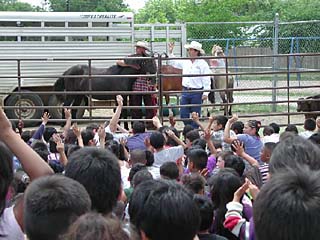Still Hungry
Reassessing the state of Austin's food security
By Virginia B. Wood, Fri., Oct. 12, 2001

(Photo Courtesy of CAFB)
When we first considered the issue of hunger in Austin in the spring of 2000, "compassionate conservative" Gov. George W. Bush was running for president on a platform that touted the tax and budget cuts in his home state. Austin was riding the crest of a high tech wave, awash in prosperity and Smart Growth. At that time, the social service agencies we visited made it clear that despite the governor's compassion and Austin's prosperity, hunger or food insecurity were very real problems in neighborhoods not 10 miles from the state Capitol complex. A short 15 months later, George W. Bush is a president with a weakening economy whose domestic agenda is overshadowed by the impending war on terrorism. The budget and tax cuts that made Bush such an attractive candidate to conservative Republicans left the most recent Texas legislature with shortfalls for the next state budget cycle. And Austin's high tech wave has washed out, leaving uncompleted buildings and thousands of layoffs in its wake. Not surprisingly, the food insecurity problems that still plague Austin's working poor, homeless, and low-income elderly are only exacerbated by these events.
In an effort to update our information on this issue, we checked in with the agencies featured in last year's story to see how they're coping today.
Capital Area Food Bank: Good News/Bad News
Our conversation with Capital Area Food Bank deputy director Dan Pruett turned out to be a good news/bad news situation. The good news is that CAFB has been able to increase the number of Kid's Cafes sites from three to eight since we last spoke, and another site is currently being researched. This means 1,100 (of the 30,000 Austin kids who could benefit from one) are receiving a hot dinner three nights a week as part of already existing afterschool programs. Each Kid's Cafe costs between $10,000 and $15,000 a year to operate, with that money going to pay cooks' salaries, purchase necessary kitchen equipment, and provide groceries for each location. The corporate partners who currently fund Kid's Cafes are Dell (three sites), Austin Community Foundation, Fired Up! Charitable Foundation, Advanced Micro Devices, ConAgra and Randalls, the Ben, Willie & Darrel Youth Classic, Grande Communications, Martin Instruments, Borden's, Michaelango's, and the Austin American-Statesman. Corporations interested in underwriting a Kid's Cafe can contact Dan Pruett at CAFB (282-2111) for more details.
While things are looking up for Kid's Cafes, the food bank itself is experiencing a serious shortage of nonperishable food items. "We've got a critical situation right now," Pruett reports. "It's as bad as it's been in the past couple of years." Pruett stresses that the agency has plenty of fresh produce and government commodities but is running dangerously low on the all-important nonperishable staples such as canned goods, rice, beans, and peanut butter. "The Central Texas agencies we serve are seeing a 178% increase in the number of calls for assistance this year," Pruett says. CAFB is struggling to keep up with the increased demand at food pantries, soup kitchens, halfway houses, family crisis centers, hospice programs, and low-income day care facilities that it supplies with food. It appears to be time for some major food drives. The food bank has a handy "Do-It-Yourself Food Drive" packet available for individuals, businesses, service organizations, church, or neighborhood groups who would like to organize donations.

Caritas' Safety Net Stretches
Caritas, an interdenominational, interfaith nonprofit located in downtown Austin, seeks "to provide a safety net for Austin's working poor, homeless and legal refugees while encouraging them to become economically self-sufficient." The busy agency provides rent assistance, food pantry vouchers, clothing, and access to other community resources to Austin's working poor. Requests for all of those services has grown in proportion to the number of job layoffs in Austin within the past year but their reduced annual revenue isn't able to meet the demands. Caritas also operates a much-needed food pantry and the Loaves & Fishes soup kitchen that serves a daily hot lunch to everyone who shows up to eat. Tib Scallon, longtime Caritas soup kitchen director, told me about the increase in demand for daily meals on his watch. When we visited the Loaves & Fishes Community Kitchen in the spring of 2000, Caritas had just moved into a new facility at Seventh and Neches and had greatly expanded the soup kitchen's service capacity. At that point, they were regularly serving lunch to 250-300 mostly homeless men, up from 200-225 in the old location. Scallon reports those numbers have jumped again: "We're serving more folks now than we ever have. One Monday we fed 400 people, and we're hitting the high 300s every day." Soup kitchen volunteers tell the boss they're seeing lots of new faces in the crowd, with a particular increase in the number of women who need the free noonday meal.
Root Issues at Sustainable Food Center
While agencies such as CAFB and Caritas are on the front lines providing emergency food assistance, the Sustainable Food Center takes a much more long-term approach to dealing with food security issues. They focus on how food is produced, distributed and consumed, operating a self-sufficiency model that really works. SFC offers cooking classes, gardening instruction and garden plots, canning and preserving workshops, and support for seasonal farmer's markets in low-income neighborhoods. They've been remarkably busy in the past 15 months, merging with the like-minded Austin Community Gardens (established in 1975) to form a stronger, more experienced organization. The new SFC has over 34 years of combined experience in helping people achieve food security, i.e. having access to culturally acceptable, nutritionally adequate food through local, nonemergency services at all times. In layman's terms, their mission is best explained by the old parable that says giving someone a fish (or fresh produce) feeds them today while teaching them to fish (or garden) feeds them for a lifetime. (The Green Corn Project, a relative newcomer, also works along these same lines; see "Cook Globally, Grow Locally," below.
New Sustainable Food Center director Terri Buchanan reports that requests for all of the services her agency offers have increased in the past year. "All 350 of our garden plots are full, with waiting lists," she says. "All our Cocina Allegre cooking classes are full, with waiting lists, and the farm stands we supported in East Austin this summer had their highest sales volume ever." She's especially proud of the Cocina Allegre Food School, staffed by a professional health educator and a professional cook. The school teaches low-income families how to budget, shop for, and prepare economical meals for their households using fresh, nutritional ingredients. The program is so successful these days, the classes are filled to capacity and have almost 100% attendance for each session. The curriculum, or facilitator's guide, to the Cocina Allegre model program is almost completed and will soon be available for sale to organizations around the country.
The hottest topic at the new SFC is their ongoing Farmer's Market Initiative. In an effort to address the problems of hunger, access to healthy food, and farm economy development, Buchanan and her board of directors have been very busy the past few months. The SFC faithful have been lobbying city and state officials, surveying area farmers and Austin consumers to assess supply and demand, all in the hopes of creating a city-supported downtown destination Farmer's Market in Austin. Their formal request for city funding to support the initiative by way of a market feasibility study was approved in September, and their quest continues. Austinites interested in supporting a central Farmer's Market are welcome to join the SFC initiative.
Food drives, soup kitchens, farmer's markets. Some people might ask why we've chosen to reconsider the issue of hunger in Austin just now, when our focus should be on supporting victims of the September 11 tragedy and standing solidly behind our president in the fight against terrorism. But as long as more than 28,000 Austin kids are in danger of going to bed without a hot meal, as long as working poor or recently laid-off Austinites are forced to decide between paying rent and feeding their families, or as long as our fixed-income elderly neighbors have to choose either prescription medications or groceries, hunger in Austin has to remain a front-burner issue. According to experts in social service and hunger fighting organizations, reinstatement of broad-based food-stamp eligibility to the president's new domestic relief package would be an effective anti-hunger program on the federal level. Closer to home, some portion of our current outpouring of generosity and compassion needs to be directed to our hungry neighbors here in Austin.








